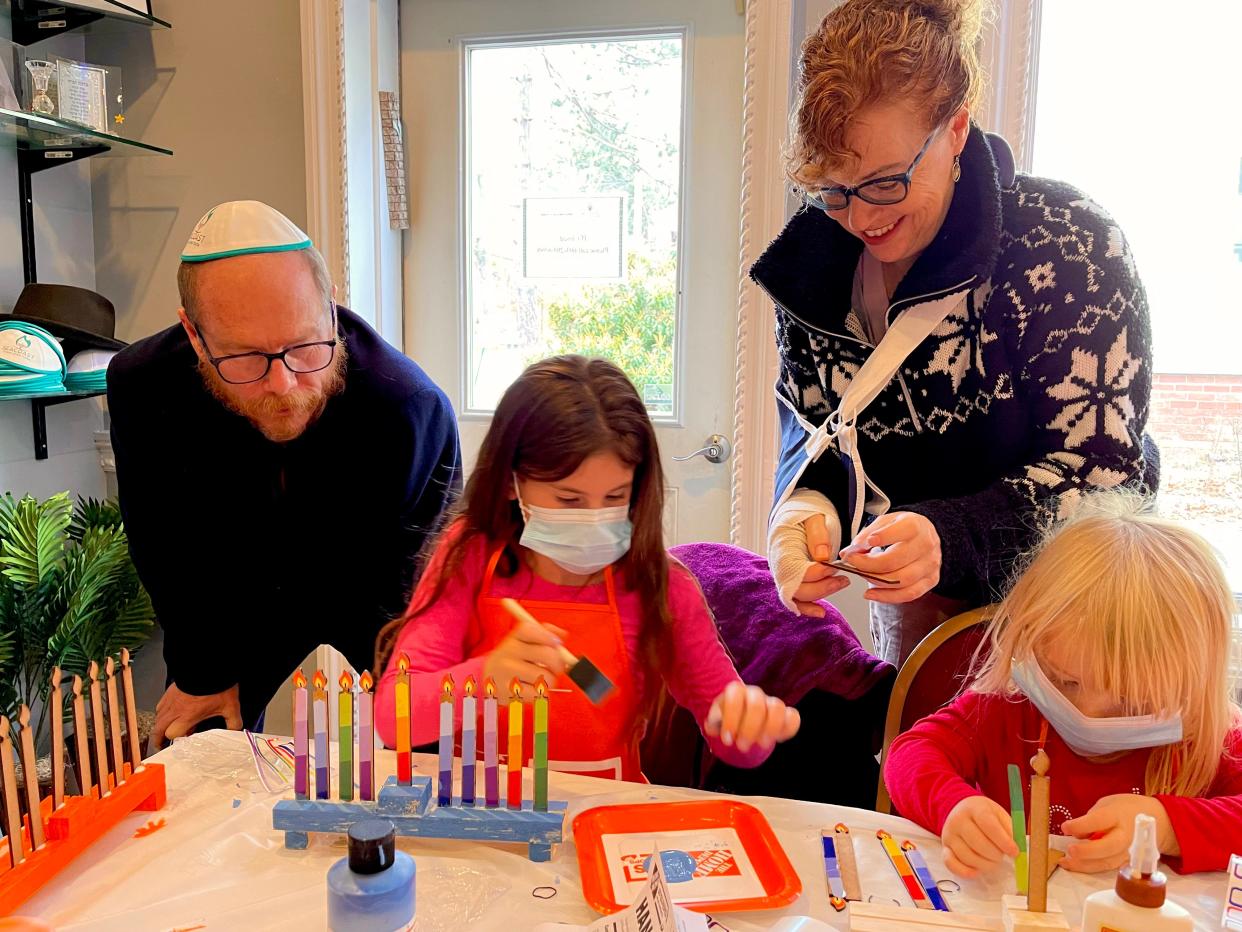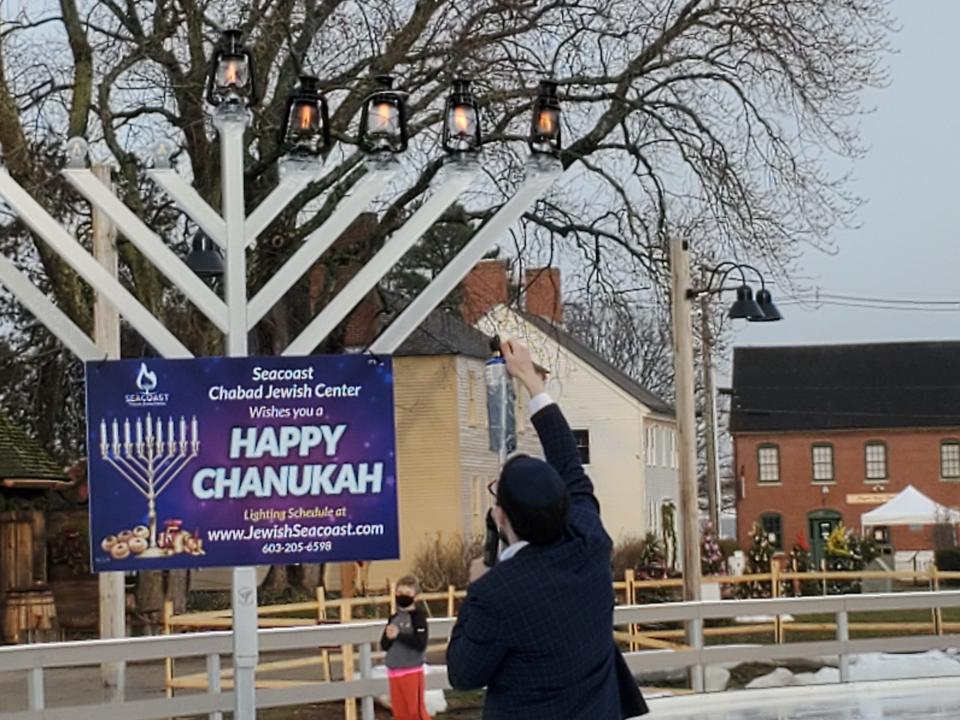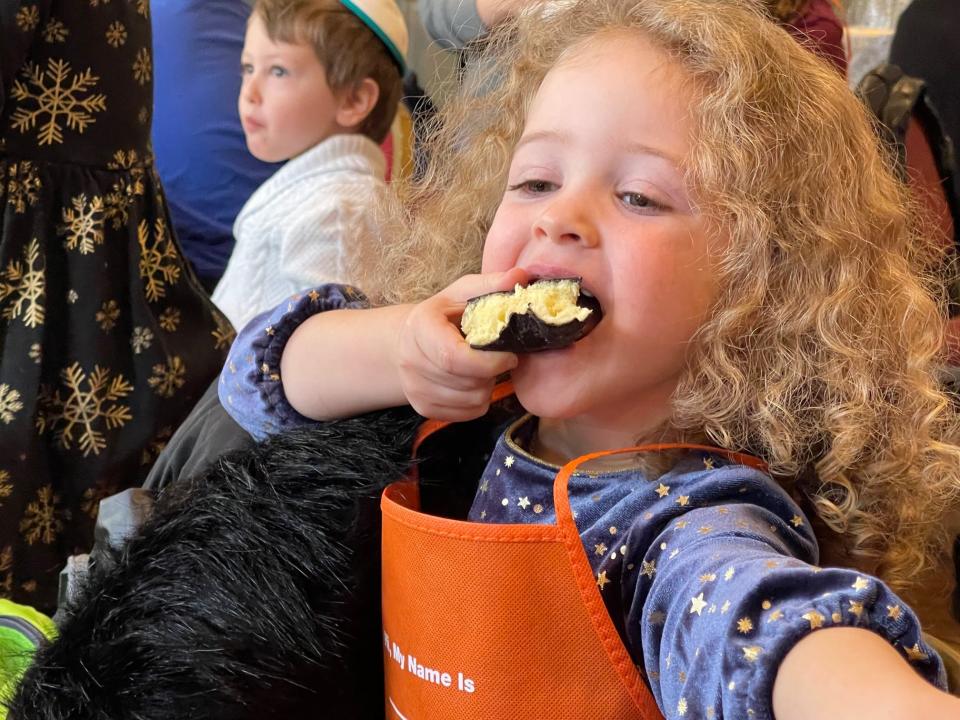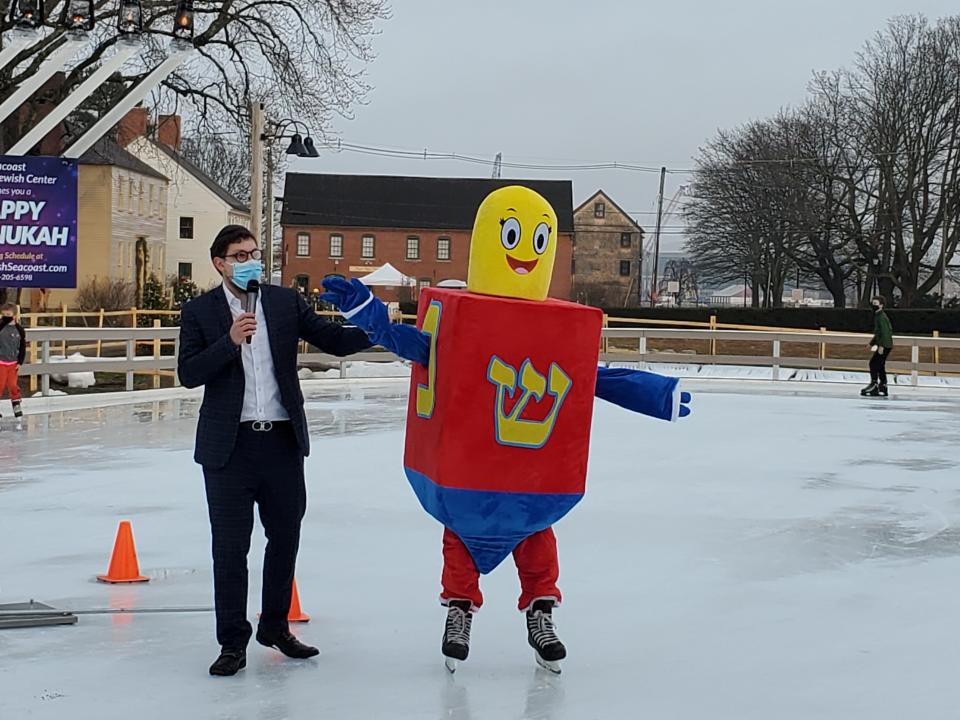Hanukkah: Seacoast Jewish community celebrates the triumph of light over darkness

Editor's note: We are reprising our story from 2021 on Hanukkah, updated with 2022 events.
The Jewish holiday of Hanukkah, the festival of lights, begins at sundown on Sunday, Dec. 18, 2022.
Jews celebrate the physical light that comes from candles in the menorah, which grows brighter as an additional candle is added for each of the eight nights of Hanukkah. According to two local rabbis, the light from the candles is also symbolic of the triumph of light over darkness in the physical and spiritual realms.
“The nature of light is such that one candle can light up many candles, and no matter how many candles the one candle lights, its own brightness is never diminished,” said Rabbi Berel Slavaticki of the Seacoast Jewish Center in Durham. “We can brighten up the lives of those around us, and it will never diminish our own brightness. On the contrary, it will make our own lives shine ever more brightly and ever more meaningfully.”
Rabba Kaya Stern-Kaufman of Temple Israel in Portsmouth also sees deep symbolic meaning in the candlelight of Hanukkah.
“It is the light of God, the spiritual light of love that lives in every human heart,” Stern-Kaufman said. “It is the way a person’s face lights up when we feel love.”
The celebration of God’s light and love which takes place in Jewish homes is meant to be shared, Stern-Kaufman said.
“One of the Jewish laws around the celebration of Hanukkah is the sharing of the light with others,” Stern-Kaufman said. “Jewish families put their menorah in the window so that their light goes out into the world. .... We are commanded to make public the light of Hanukkah with the rest of the world. It is not just meant for Jewish people.”
But what exactly is Hanukkah?

The Hanukkah story
Unlike Jewish holidays prescribed in the Torah, which include Yom Kippur, Rosh Hashanah and Passover, Hanukkah is a rabbinic holiday that celebrates the triumph of a small band of warriors, the Maccabees over the Syrian-Greek armies, who had tried to enforce a decree that they assimilate into the Hellenistic culture and renounce their Jewish faith.
After the Maccabees re-captured Jerusalem, they found the temple desecrated, its sacred oil lamps extinguished. The story tells of the Maccabees finding a small earthen jar of oil that held only enough to burn for one day, but when they lit the candelabra the oil burned for eight days, hence the eight days of Hanukkah.
While there are eight nights of Hanukkah, the menorah actually has nine candle holders, one for each night and one for the helper candle, called the Shamash, which is used to light the other candles.
In tribute to the miracle of the oil burning for eight days, foods associated with Hanukkah are generally fried in oil. Potato pancakes, known as latkes, are a tradition as are fried jelly donuts known as sufganiyot.

What is a dreidel?
During Hanukkah, Jewish children play a game using a four-sided spinning top known as a dreidel and chocolate coins known as gelt, the Yiddish word for money. Each side of the dreidel is marked with a Hebrew letter, nun, gimmel, hey or shin. These four letters are an acronym for “a great miracle happened here.”
The game starts with each child putting a chocolate coin in the pot. Children take turns spinning the top. If it lands on nun, nothing happens; gimmel they take the whole pot; hay wins half the pot and if you land on shin you put a coin in the pot.
Rabba Stern-Kaufman explains that the dreidels were used as a subterfuge when, under Syrian-Greek rule, Jews were forbidden to study Torah and say their traditional prayers. Legend has it that Jewish children would go to the woods to study and pray and if they heard soldiers coming they would quickly take out their dreidels and begin to play.

Why are presents given on Hanukkah?
The giving of presents on each of the eight nights of Hanukkah is a relatively new tradition and came about as a response to the gift giving among non-Jews during Christmas, Stern-Kauffman said.
“My parents were born in the 1930s and they did not receive gifts for Hanukkah,” Stern-Kauffman said.
In the 1940s and 1950s, as consumerism increased with the Christmas holidays, Jewish families began giving gifts for Hanukkah so Jewish children would not feel left out,” Stern-Kaufman said.
Ultimately, the message of Hanukkah is a message of hope.
“The nature of light is that it is always victorious over darkness,” Rabbi Slavaticki said. “A small amount of light dispels a lot of darkness. This gives us a great deal of hope and a great deal of confidence, it offers us the certainty that goodness and kindness will ultimately prevail over darkness and falsehood.”
Hanukkah community events
Both the Seacoast Jewish Center and Temple Israel have a number of Hanukkah related community events that are open to the public. Those interested in attending are asked to RSVP in advance for some events. For more information on Seacoast Jewish Center events, visit jewishseacoast.com, call 603-584-4111 or email office@jewsishseacoast.com. For more information and to register for Temple Israel events, visit templeisraelnh.org/pray/holidays/hanukkah.
Some of the events they're hosting are listed below. Check out their websites for more events and details.
Dec. 18 to 25
Temple Israel in Portsmouth will hold a Candle Lighting in its Courtyard every evening at 5:30 p.m. except Dec. 21. On Dec. 23, the Candle Lighting will take place at 3:30 p.m.
Sunday, Dec. 18
Temple Israel will hold a Hanukkah Story Hour with SAAC at Discover Portsmouth Center, 10 Middle St., at 2 p.m.
The Seacoast Jewish Center will present Chanukah On Ice at Strawbery Banke Museum rink from 2 to 4 p.m. and will include skating to Jewish Music, lighting a 9-foot Menorah, doughnuts, crafts and the Dreidel Men.
Monday, Dec. 19
Seacoast Jewish Center will present the Car Menorah Parade through downtown Portsmouth at 4:30 p.m.
Wednesday, Dec. 21
Temple Israel will hold a Community Hanukkah Party at 5 p.m. at the temple. Free and open to all.
Seacoast Jewish Center will host a Hanukkah Happy Hour Adult Party at North Country Hard Cider, 38 Littleworth Road, Dover at 7 p.m. with a buffet, latkes, doughnuts, cider and music.
Thursday, Dec. 22
The Seacoast Jewish Center invites the public to The Great Gelt Drop at 4 p.m. where chocolate coins will be dropped from a fire truck ladder at the Fox Run Mall and a Hanukkah celebration will follow.
This article originally appeared on Portsmouth Herald: Hanukkah: Seacoast Jewish community celebrates light over darkness

